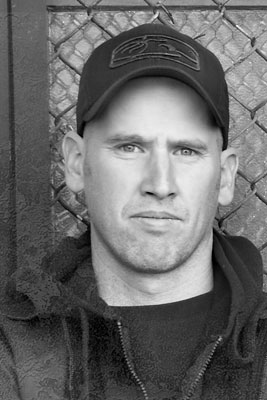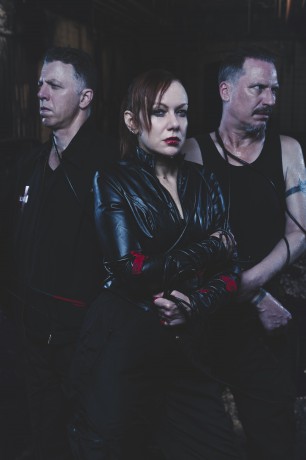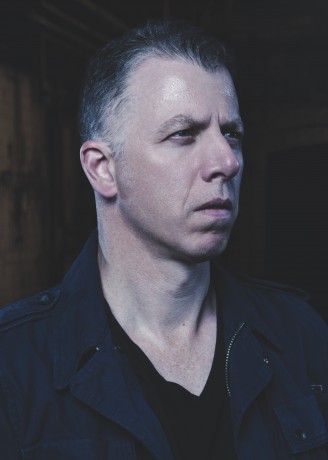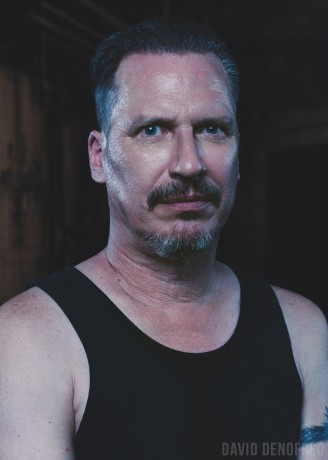
Back in 2015, the lead singer and co-founder Tod Law of Unit:187 died of leukemia. Leaving a huge hole in both the Vancouver industrial scene and in the band, that could easily have been the end of this impressive group. But if we fast-forward to 2024, there’s new life surging and the album “KillCure” is ready to be unleashed on the masses, via Metropolis Records. I’ve been following the process for a while, having heard clips of the songs in an unfinished state, before they were sent off for mastering. Even then, they sounded massive.
Now, Unit:187 consists of founder John Morgan, as well as Chris Peterson – who you might know from Front Line Assembly, Decree, Will and Ohmelectronic – and Kerry Vink Peterson – formerly of Stiff Valentine, who’s now taking on the vocal duties. Together, they tell me the story about how the band started, almost ended, and finally came back. And since the album is an homage to Tod, why not start off getting to know who he was?
John: Tod was the nicest guy you’d ever meet. Pretty much the easiest guy to hang around with as well, there was never any drama. He was also a great artist in so many ways – graduating from Emily Carr Institute for the Arts. He was really into modeling, and would create and paint miniature models, mostly of figures from horror movies. His taste in music was incredible – he always had the best music collection and you could tell he deeply understood the subtle things about good music and shows. He was a real fan of live shows and the frontmen i bands, which made him such a good stage presence when we played live. He saw countless Skinny Puppy shows and I think really got what Ogre was trying to do with all the theatrics, but he also understood where a lot of those roots came from in the punk scene with frontmen like Jello Biafra.
The early days
So, how did Unit:187 come together in the beginning?
John: I met Tod Law in 1994, hanging out at the Twilight Zone club in Vancouver which played industrial music and had a bit of a scene. I think it was Tod that mentioned we should go see the 1994 AngstFest tour with KMFDM, Chemlab, and Diatribe in Seattle, so we drove down together. During the three hour trip, we talked a lot about music and realized we had a lot of common interests. Tod always had great music with him and was deeply into obscure industrial music. Shortly afterwards we started working on our own original music and eventually signed our first album to 21st Circuitry Records.
After the self-titled first album, work continued with “Loaded”, the second album where you got fellow Vancouverite Devin Townsend as a producer. How did this come about?
John: It was pretty interesting actually. I knew Devin before Strapping Young Lad, as another band I was in opened for his “Grey Skies” project on a Metal Monday at Club Soda in 1992. A few years later, our first guitarist Ashley Scribner was also playing bass for the very first few live shows Strapping Young Lad did for the debut album “Heavy as a Really Heavy Thing”. I also knew Devin’s drummer, Adrian White as well through other local bands. Ashley played Tod and I a cassette demo of Devin’s first recording of S.Y.L, which he was recording at that time at Mushroom Studios. I was completely blown away. A few years later, Strapping Young Lad recorded “City” and Devin wanted to put a more serious live show together and go on tour, and I was asked if I wanted the keyboardist gig. SYL ended up doing a European tour in the Spring of 1997, and then some follow up tours that fall. In 1998, we had most of “Loaded” songs written, and had a chance to record the album during a two week session in July 1998 at Nettwerk’s Slack Studios. I don’t even think Tod and I asked Devin to produce the record, he just did it for free which was incredibly cool. He basically took our collection of songs and did the Devin power session for us over two weeks. Needless to say our production quality improved dramatically.
Growing the team
Time for album number three: “Capital Punishment”. At this time Chris Peterson started to become more and more involved. Here is where you’ll find one of my all time favourite tracks “Anger Management Part 2”. There’s also a suitably fucked up “Second Class Citizen” remix by Decree.
John: First time I met Chris was when I saw him play with Front Line Assembly live on the “Tactical Neural Implant” tour in 1992. Chris was around as well at the old Front Line studio on 1st Ave. in Vancouver, which was in the same building as Nettwerk’s Slack Studios. When we recorded “Loaded” in 1998, we would peek into the Front Line space and marvel at the walls of synths in there. Bill Leeb still had all his gear back then. I eventually got to know Chris and Kerry much better through hanging out with Tod Law at this industrial music club in Vancouver, the Twilight Zone. We used to go there during the week and listen to our tracks being played and there was a bit of a scene for sure.
John: Chris and Tod started hanging out a bit in the late 90:s and then quite a bit more in the early 2000:s. I’d meet them from time to time at clubs for a drink and we hang out a bit as well. Tod and Chris became pretty good friends and we got Chris working on some remixes and songs for us. By the time “Capital Punishment” came out in 2003, Chris was quite involved with the band, doing several remixes and working on new songs with Tod.
Chris: My relationship started with remixing, and then eventually working on songs with Tod and John. Ross Redhead came into the picture later for the album “Out for Blood”. Ross and I had a good working flow going with Decree, so it was an easy call to have him be a big contributor to that album. I think it was a matter of everyone having really busy schedules, besides developing chemistry together. I would get songs in a more raw state through Tod from Johnny and then further develop them and have Ross adding parts as well. I think just having that many people contributing helped counter the heavy work schedules we all had at the time. It really helped keep the momentum going for “Out for Blood”.
John: I think in the 2000:s things got pretty busy for everyone. Tod and I had young kids and we both were working so much at our day jobs. We never really stopped hanging out and writing, but things definitely slowed down a lot. Chris worked with us a lot on 2003’s “Capital Punishment”, doing several remixes and being more involved in production of several songs. By 2010 I think we realized we had something more musically to say, and over that time Tod and Chris were working more closely on music, so it seemed right at that point to restructure the band around the lineup for “Out for Blood”, which was Tod, Johnny, Chris and Ross.
I recently revisited “Out for Blood”, and was struck by how incredibly heavy it is! Slow, menacing songs with a Tod sounding more pissed off than ever. After that though, things got a bit quiet, except for a remix album in 2012 called “Transfusion”. And of course in 2015, Tod died, and the future of the band was in doubt. Before he died however, the band had started writing a few new songs, with vocals already recorded by Tod.
Rebirth
When Tod died, were you prepared to shut down the band for good?
John: That’s an interesting question, as Tod was definitely the main driver behind the band for so many years, especially in the 2000:s. It would have been easy to just end things, but I think we knew we’d keep the band going to finish some of the music we’d started and then see what happened.
Can you talk a bit about how things got started again?
Chris: For this new album, “KillCure”, we have had talks for some time about finishing off a tribute to Tod. About two years ago, I felt like I really needed to do this now. It’s something about the timing just feeling right, and the need to say we did our best and make it more than talk and ideas. A lot of emotions are tied to this and I hope it is good for all who loved Tod to hear what we had left of unfinished material and re-work it into something we feel like Tod himself would really love to hear.
John: Chris, Kerry and I would get together and hang out and talk about Tod and finish the songs we had in the works, so basically that’s how it started again a few years after Tod’s death. As we pieced things together, we had a few songs which were missing vocal parts and some without any vocals at all. Chris and I didn’t really feel comfortable having another singer join the band, and it was just super natural for us to have Kerry sing the missing parts as she probably more than anyone understands Tod’s vocal attitude and style as they were very close friends. I think once we recorded “Glamhammer” and had it mixed, we realized that we had everything we needed with the three of us.
Kerry’s part
This brings us neatly to the band’s new singer, Kerry. In her own words:
Kerry: Well, my contribution started with some backing vocals on “Out for Blood”. Chris had brought me into it after Tod had heard what I’d been doing with my former band Stiff Valentine. Before Tod got sick, a new album was in progress. I had recorded what I thought would just be backing vocals on “Glamhammer”, but Tod liked hearing my voice with him for the entire song, so we ended up having it be a duet. At that point I wasn’t really expecting to be on any more tracks.
What was the first song you tracked vocals for?
Kerry: The first one solo (after “Glamhammer”) ended up being “Eyes Open”. Once it was discussed that the unfinished material was potentially being released, they decided to let me try coming up with some lyrics and vocals for two unfinished sketch tracks. The two that Tod wasn’t able to do a vocal on at the time. I basically fell in love with them and thought I’d give it a go. The second one ended up being “Swallow”. Since I had two Living Room Project albums with some lead vocals and writing lyrics under my belt, I figured why not try?
Tod had a very specific singing style, how did you approach doing vocals for this?
Kerry: I listened to a lot of Tod while making these songs. Various tracks and older material where his voice was younger and almost had a different pitch. After singing backups to male lead vocals in other projects, I always tried to match their voices to sound more like an effect as opposed to my normal singing voice. This made it easier for me, I think. I also tend to prefer a male vocal in a lot of what I listen to or am inspired by. For this style of music, I prefer to have a bit more power behind my voice. To me, it suits the style more than a more traditional or pretty voice as I sometimes say.
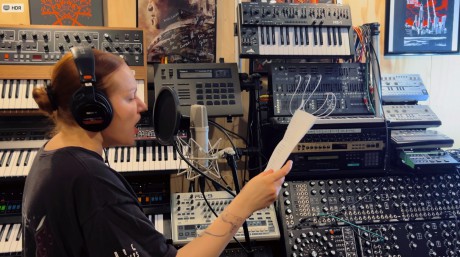
Kerry belting it out in the studio.
What’s your approach to writing lyrics?
Kerry: Well, for example on the track “KillCure”, which was left to us with only partial Tod vocals and was completely reassembled by Chris. I had to fill in the gaps. I found that one quite difficult considering the subject matter and what I knew he had written his parts about. John helped inspire my words as well. I feel that one was a collaborative effort for my part. My lead tracks are clearly about things that have been or are annoying me. Things that make me angry, haha! Not going to lie, some were written early mornings from my desk at my day job or on transit. Drawing inspiration from the monotony or even the online world being rammed down our throats clearly comes out in these tracks. This is where working at home with Chris comes in handy (they are married – editor’s note). He fine tunes my ramblings and helps me structure them with timing and phrasing suggestions. Pushing me out of my comfort zone like a good producer should. It’s always been therapeutic for me to use music as an outlet for my feelings as I assume it is for most musicians.
Are you involved all the way?
Kery: I would say the musical parts and structure of the new material all starts with John and Chris, I don’t get the sketches until they are properly assembled and ready for a vocal. I hear them in all of their stages though. And more instrumental parts or sounds tend to be added after a rough track of my vocals are laid down.
Do you have a favourite track to sing on the new album?
Kerry: Hard to pick one but I would say “Swallow”. I enjoyed every part of tracking my vocals for that. It was fun to be able to switch up my voice from almost speaking to full on yelling in that chorus. I can’t wait to try that one live someday. Close second would be “Overrun”. The chorus specifically! It’s just straight up fun for me.
In full swing
So now, they’re a band again, with new singer and all. Slowly, things are in full swing again.
Which tracks did you start working on first?
Chris: The tracks that feature Ross Redhead were all written while Tod was still with us. “New Beginning” was just written and finished by me, Ross and Tod shortly after finishing “Out for Blood”, and Johnny sent that off to Ken Marshall to mix right away. So that song was already done way back then.
“Glamhammer” was the next song shortly after, with all of us contributing to it, and Kerry joining Tod on vocals for it. Unlike “New Beginning”, we didn’t send that off to Ken right away. “Glamhammer” was written long enough ago, however, so I felt I had to say to Johnny that I think this song really needs Ken Marshall’s touch when I started getting serious about finishing this album about two years ago. Sadly Tod did not get the chance to work on the other two songs featuring Ross’ guitar and bass work, “Eyes Open”, and “Swallow”. They sat unfinished for some time, and then it clicked in my head that Kerry should give the vocals a shot for them. Johnny and I were really pleased with the results, and that got us going on writing some new songs together. It was special to co-write with John in a much more direct way than we have before, and with Kerry’s vocals, it got us thinking we should just keep rolling with it.
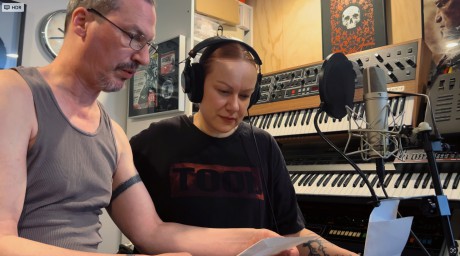
Chris and Kerry in the studio.
Does a track usually start with Chris or Johnny?
John: Usually it starts with me, laying down a synth riff, bass-line and some drums. Chris then takes that and adds a lot of grit, dirt and character, basically making it sound cool. Kerry will start thinking about lyrics at this time, trying some ideas. From there I might jump back in and do some restructuring and samples, and get a proper edit together. Around this time, we usually track Kerry’s vocals and get that all sorted. We’ll also track guitar and other bits as needed. Then Chris usually takes over and brings it home, adding in modular stuff, polishing turds until they aren’t brown, and then working on a final mix. That formula has worked pretty well for us this time around.
Chris: Ya, what Johnny said pretty much! I like to take a raw concept and then build it up, tear it apart and rebuild, whichever is needed. It all comes together pretty naturally, and when it’s really working, it’s going to start leading you instead of you trying to smash things together that just don’t make sense.
Gear talk
For the nerds out there, what’s the studio setup?
John: My main studio synths I go to often are the Prophet-5, Arp 2600, and Roland SH-101. Nothing new – all old gear for the most part. Very few software synths, mostly tracking old stuff. Often I’ll use a TR-909 or a TR-808 as well, although Chris often replaces my drums with beefier stuff. There’s always some samples in there – I still use an old Akai S3000XL for sampling, and I have a few things that just make noise like the Soma Labs Lyra-8.
Vancouver legend Greg Reely is taking care of the mastering, and judging by the released single “Dick”, we’re in for a treat when the album arrives.
Chris: Greg is my insurance policy, haha! He will let me know if something is off in my mixing, and his mastering just brings out details that still surprise me. Greg has influenced me pretty much the entire time I have been making music to be fair. I have been very fortunate to have worked with him as much as I have and it is a humbling and awesome experience that has had a big impact on how I hear things, production values, the importance of really knowing your dynamics and EQ basics, I could go on for a while really. Also, of great importance is that when it comes to riding that line of having a good mastering volume, versus going too far with volume and killing the dynamics, I trust him much more than anyone else. And as a basic rule for me, I never master my own mixes if I can avoid that.
John: Greg Reely has always been a name around Vancouver that was synonymous with audio quality. I love looking back on old vinyl and seeing his name show up in the credits – especially some of the old Nettwerk records. He actually used to own a store called Reely Unique right beside Nettwerk’s offices which rented high end studio gear back in the early 90:s. The albums he’s mixed and mastered always sound killer, some of them are my all-time favourites – such as Fear Factory’s “Demanufacture”. So having Greg master our songs is really almost a must-have. We trust his ears especially for our type of music, and he honestly does some magic that makes every song sound better.
How did Ken Marshall get involved?
John: Hiwatt’s always been part of the Unit:187 family going back to 2003’s “Capital Punishment”. Ken and I used to work at Electronic Arts together in the sound department, so we had access to this ridiculous studio that sat idle half the time. We both would go in there and crank up our mixes on these ridiculously huge Westlake monitors. Ultimately Ken just wanted to get involved with the band and do remixes or mixing for us. Sometimes if we feel we’ve hit a creative or mixing roadblock with a song, we just give it to Ken and he works out all the kinks and adds his magic. That’s the thing with Hiwatt, it’s never just a “mix” – there’s always some very liberal remixing that goes along with anything he does as he always just wants the track to be better in any way possible. So for “Glamhammer” and “New Beginning”, those tracks got the Hiwatt treatment.
Any favourite songs on the new album?
John: I like them all – I keep saying to Chris and Kerry – the album is all killer no filler. But the songs I keep playing over and over are “Dick”, “Overrun”, and “KillCure”. It’s rare for me to play my own music as much as I’ve been, so that must be a good sign.
The future
With a reformed band, and a new album out very soon, what does the future look like? Will there be more music coming?
John: Absolutely, I’m having a lot of fun writing music with Chris and Kerry and already have some more ideas coming. I think our production methods also let us work a bit quicker now and experiment more so it’s likely we’ll start working on new tracks shortly and hopefully it won’t take years to get another album out.
We’re pretty excited about the current version of Unit:187 and I really like the sound we have going, so I definitely think there’s more to come. We’ll likely keep working on new tracks over the next year until we have another release ready. It’s been really fun to work on music together so we just want to keep it going.
What about live?
John: Hell yeah, we have some gigs starting to be planned and we’re going o be starting to rehearse this fall for upcoming shows in 2025.
Chris: What he said. Would love to perform again and loud as fuck.
“KillCure” is out on Metropolis Records on December 6. Pre-order here.
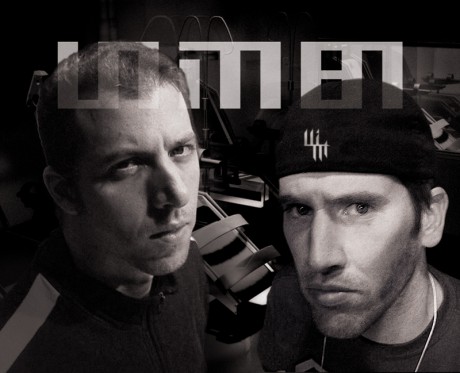
John and Tod in the early days.
Photo credits
Band pictures: David Denofreo
Music studio picures: John Morgan

